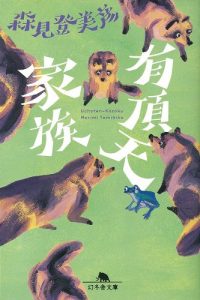(熱帯 森見 登美彦)
I don’t normally write in-depth summaries of the books I read, but this one had an intricate enough plot that I wanted to do it for myself, and hopefully, someone else will come across this and find it helpful. This book has the most complicated plot I have read. Early on, we learn that one of the characters carries around a notebook to keep track everything that happens, a lesson he learned after his copy of The Tropics, a mysterious book that no one has ever finished, disappeared.
I took this as a hint and began writing down what happened as I read. If you plan to read this book I would suggest doing the same, or to save time, you can use my summary as a map.
Obviously, this includes spoilers, so if you plan on reading the book come back when you’re finished. Here goes:
Continue reading “Japanese Book Review: The Tropics by Morimi Tomihiko”



